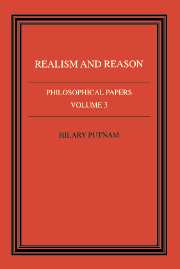Book contents
- Frontmatter
- Contents
- Dedication
- Introduction
- 1 Models and reality
- 2 Equivalence
- 3 Possibility and necessity
- 4 Reference and truth
- 5 ‘Two dogmas’ revisited
- 6 There is at least one a priori truth
- 7 Analyticity and apriority: beyond Wittgenstein and Quine
- 8 Computational psychology and interpretation theory
- 9 Reflections on Goodman's Ways of Worldmaking
- 10 Convention: a theme in philosophy
- 11 Philosophers and human understanding
- 12 Why there isn't a ready-made world
- 13 Why reason can't be naturalized
- 14 Quantum mechanics and the observer
- 15 Vagueness and alternative logic
- 16 Beyond historicism
- Bibliography
- Acknowledgements
- Index
13 - Why reason can't be naturalized
Published online by Cambridge University Press: 06 January 2010
- Frontmatter
- Contents
- Dedication
- Introduction
- 1 Models and reality
- 2 Equivalence
- 3 Possibility and necessity
- 4 Reference and truth
- 5 ‘Two dogmas’ revisited
- 6 There is at least one a priori truth
- 7 Analyticity and apriority: beyond Wittgenstein and Quine
- 8 Computational psychology and interpretation theory
- 9 Reflections on Goodman's Ways of Worldmaking
- 10 Convention: a theme in philosophy
- 11 Philosophers and human understanding
- 12 Why there isn't a ready-made world
- 13 Why reason can't be naturalized
- 14 Quantum mechanics and the observer
- 15 Vagueness and alternative logic
- 16 Beyond historicism
- Bibliography
- Acknowledgements
- Index
Summary
The preceding chapter described the failure of contemporary attempts to ‘naturalize’ metaphysics; in the present chapter I shall examine attempts to naturalize the fundamental notions of the theory of knowledge, for example the notion of a belief's being justified or rationally acceptable.
While the two sorts of attempts are alike in that they both seek to reduce ‘intentional’ or mentalistic notions to materialistic ones, and thus are both manifestations of what Peter Strawson (1979) has described as a permanent tension in philosophy, in other ways they are quite different. The materialist metaphysician often uses such traditional metaphysical notions as causal power, and nature quite uncritically. (I have even read papers in which one finds the locution ‘realist truth’, as if everyone understood this notion except a few fuzzy anti-realists.) The ‘physicalist’ generally doesn't seek to clarify these traditional metaphysical notions, but just to show that science is progressively verifying the true metaphysics. That is why it seems just to describe his enterprise as ‘natural metaphysics’, in strict analogy to the ‘natural theology’ of the eighteenth and nineteenth centuries. Those who raise the slogan ‘epistemology naturalized’, on the other hand, generally disparage the traditional enterprises of epistemology. In this respect, moreover, they do not differ from philosophers of a less reductionist kind; the criticism they voice of traditional epistemology – that it was in the grip of a ‘quest for certainty’, that it was unrealistic in seeking a ‘foundation’ for knowledge as a whole, that the ‘foundation’ it claimed to provide was by no means indubitable in the way it claimed, that the whole ‘Cartesian enterprise’ was a mistake, etc., – are precisely the criticisms one hears from philosophers of all countries and types.
- Type
- Chapter
- Information
- Philosophical Papers , pp. 229 - 247Publisher: Cambridge University PressPrint publication year: 1983
- 14
- Cited by



